Principles of Care: Balancing Rights and Protecting Vulnerable People
VerifiedAdded on 2023/06/04
|12
|3084
|274
Essay
AI Summary
This essay delves into the multifaceted principles of care within the health and social care sectors. It begins by outlining the fundamental principles that guide healthcare practices, emphasizing person-centered approaches, patient rights, and ethical considerations. The essay then explores the practical application of these principles, highlighting the significance of effective communication, confidentiality, and patient autonomy. Furthermore, it examines the impact of relevant policies, legislation, and codes of practice on care delivery, including the role of law in safeguarding vulnerable individuals. The discussion extends to the ethical dilemmas and conflicts that can arise in care settings, emphasizing the importance of balancing patient autonomy with the need to protect vulnerable individuals, as well as the role of risk management in ensuring patient safety. The essay also incorporates Maslow's Hierarchy of Needs to analyze the motivations and requirements of individuals in care. Finally, the essay underscores the importance of respecting patient diversity and promoting equality in care, and concludes with a discussion of the challenges and potential risks in the field, advocating for proactive measures to enhance patient care and safety.
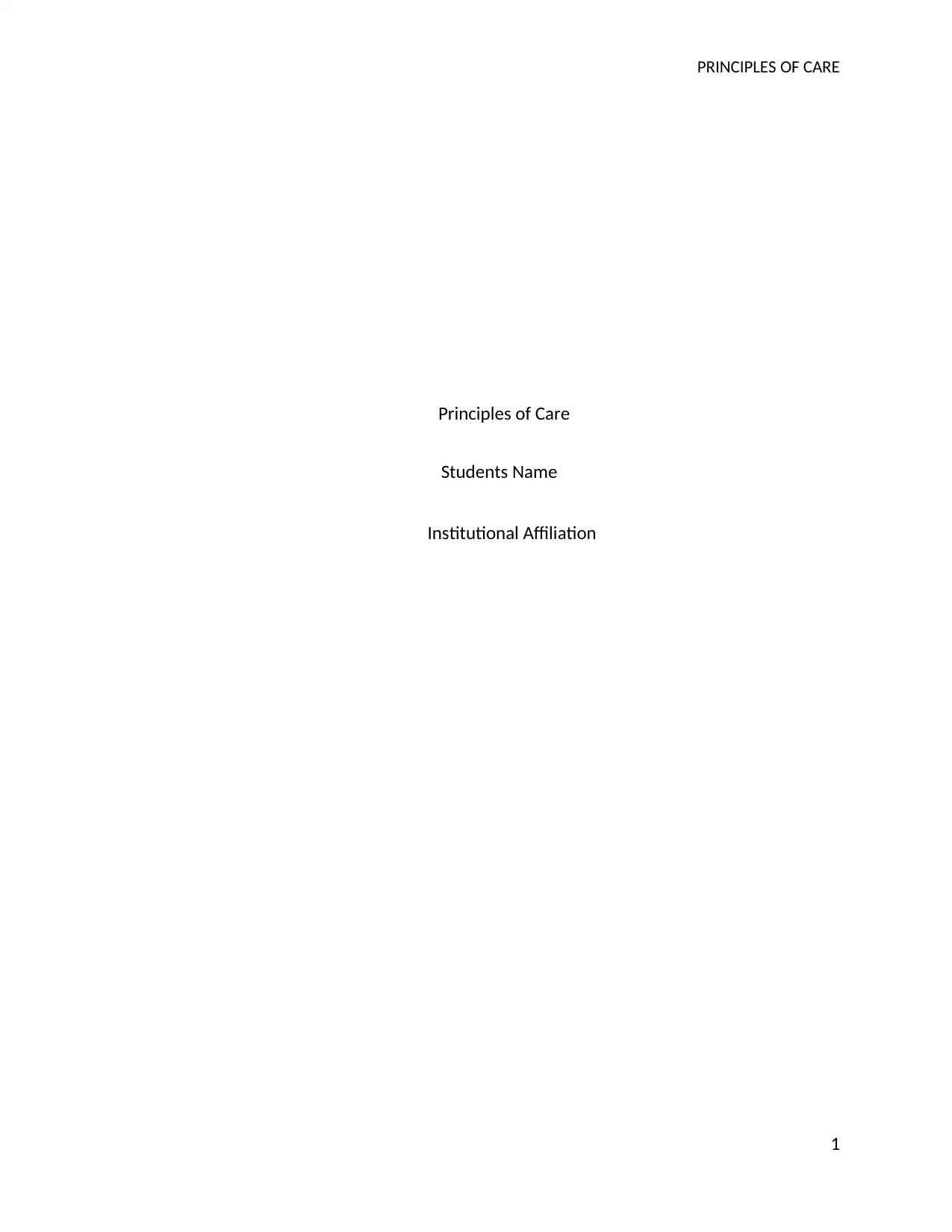
PRINCIPLES OF CARE
Principles of Care
Students Name
Institutional Affiliation
1
Principles of Care
Students Name
Institutional Affiliation
1
Paraphrase This Document
Need a fresh take? Get an instant paraphrase of this document with our AI Paraphraser
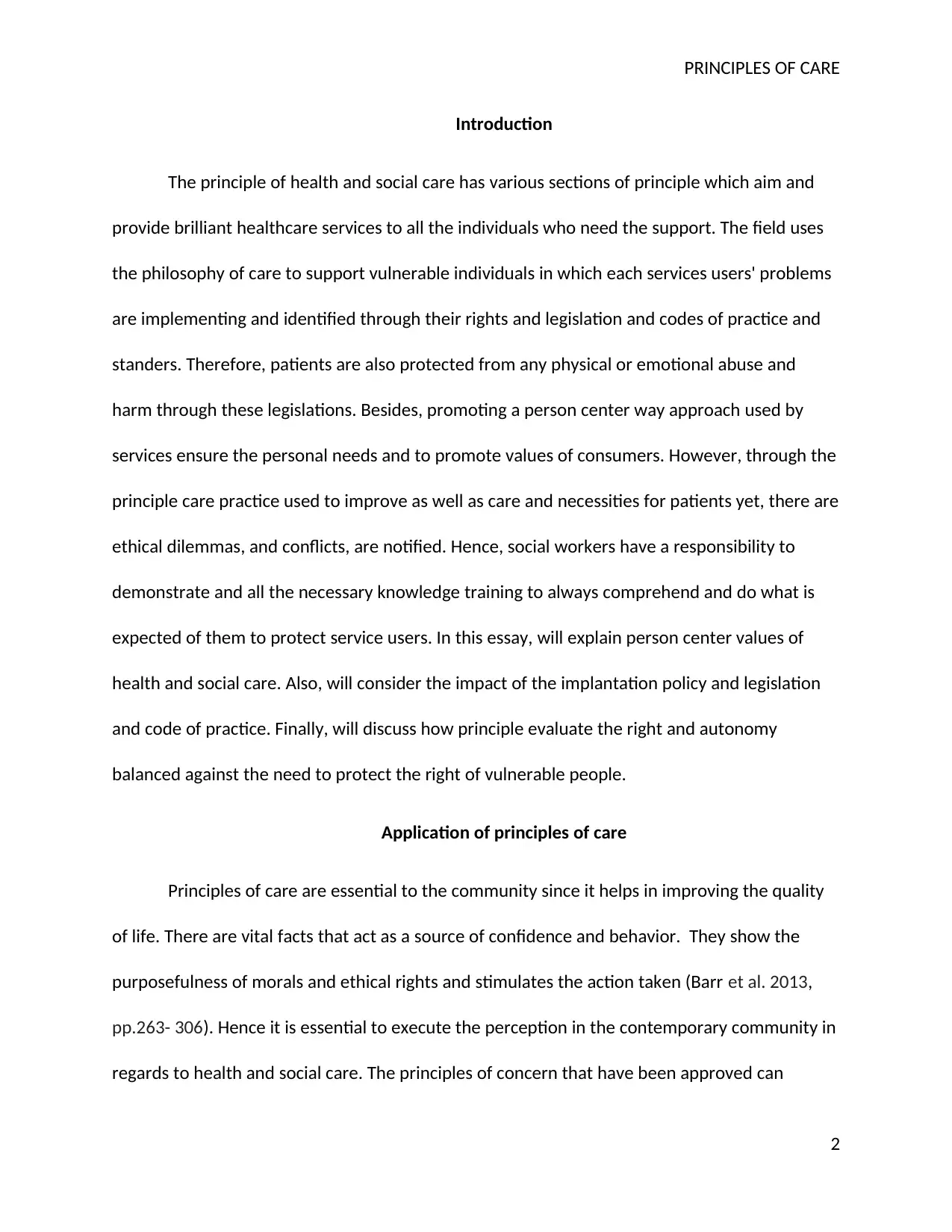
PRINCIPLES OF CARE
Introduction
The principle of health and social care has various sections of principle which aim and
provide brilliant healthcare services to all the individuals who need the support. The field uses
the philosophy of care to support vulnerable individuals in which each services users' problems
are implementing and identified through their rights and legislation and codes of practice and
standers. Therefore, patients are also protected from any physical or emotional abuse and
harm through these legislations. Besides, promoting a person center way approach used by
services ensure the personal needs and to promote values of consumers. However, through the
principle care practice used to improve as well as care and necessities for patients yet, there are
ethical dilemmas, and conflicts, are notified. Hence, social workers have a responsibility to
demonstrate and all the necessary knowledge training to always comprehend and do what is
expected of them to protect service users. In this essay, will explain person center values of
health and social care. Also, will consider the impact of the implantation policy and legislation
and code of practice. Finally, will discuss how principle evaluate the right and autonomy
balanced against the need to protect the right of vulnerable people.
Application of principles of care
Principles of care are essential to the community since it helps in improving the quality
of life. There are vital facts that act as a source of confidence and behavior. They show the
purposefulness of morals and ethical rights and stimulates the action taken (Barr et al. 2013,
pp.263- 306). Hence it is essential to execute the perception in the contemporary community in
regards to health and social care. The principles of concern that have been approved can
2
Introduction
The principle of health and social care has various sections of principle which aim and
provide brilliant healthcare services to all the individuals who need the support. The field uses
the philosophy of care to support vulnerable individuals in which each services users' problems
are implementing and identified through their rights and legislation and codes of practice and
standers. Therefore, patients are also protected from any physical or emotional abuse and
harm through these legislations. Besides, promoting a person center way approach used by
services ensure the personal needs and to promote values of consumers. However, through the
principle care practice used to improve as well as care and necessities for patients yet, there are
ethical dilemmas, and conflicts, are notified. Hence, social workers have a responsibility to
demonstrate and all the necessary knowledge training to always comprehend and do what is
expected of them to protect service users. In this essay, will explain person center values of
health and social care. Also, will consider the impact of the implantation policy and legislation
and code of practice. Finally, will discuss how principle evaluate the right and autonomy
balanced against the need to protect the right of vulnerable people.
Application of principles of care
Principles of care are essential to the community since it helps in improving the quality
of life. There are vital facts that act as a source of confidence and behavior. They show the
purposefulness of morals and ethical rights and stimulates the action taken (Barr et al. 2013,
pp.263- 306). Hence it is essential to execute the perception in the contemporary community in
regards to health and social care. The principles of concern that have been approved can
2

PRINCIPLES OF CARE
confirm that equality in service provision is present and the confidentiality is preserved, and the
rights of the victims are protected and considered. Also, proper communication skills are
essential in the health and social sections. Appropriate communication is crucial since it creates
understanding between the patients and the caregivers.
Confidentiality is essential in both health and social care settings. It is critical in
enhancing good relationships between the caregiver and the victim. A lot of information is kept
confidential during the admission of the victim in the health and social care facility (Dang,
Westbrook, Njue and Giordano 2017, p82). Confidentiality is required to protect the patient
from discrimination and other related issues. The workers at the hospital will gain a lot of
knowledge and understanding that the information given by the individual must be used to
assist the victim and not to be shared among other individuals. However, in some situations,
data had to be shared but done with the consent of the sufferer (Lakdawala 2015, p.98). The
care providers must ensure that they fight oppression and challenge it and refuse to be part of
it. All patients and staff must be treated equally to enhance respect. Equality improves good
interpersonal relationships between the care provider and the victim.
Patient autonomy is explained as an ethical principle in healthcare. It is the right of the
victim to determine his or the health issues. Informed consent is referred to as a voluntary
decision made by a competent, autonomous person to accept or reject some proposed
activities (Dickinson and O'Flynn, 2016). Autonomy and privacy and informed consent are vital
within care and surgical settings. For instance, in the surgical context, sufferers might need
highly specialized nursing care, assistance with their actions daily and technological
recommendations during the pre-, peri-, and postoperative times (Wallace 2000, 727–30).
3
confirm that equality in service provision is present and the confidentiality is preserved, and the
rights of the victims are protected and considered. Also, proper communication skills are
essential in the health and social sections. Appropriate communication is crucial since it creates
understanding between the patients and the caregivers.
Confidentiality is essential in both health and social care settings. It is critical in
enhancing good relationships between the caregiver and the victim. A lot of information is kept
confidential during the admission of the victim in the health and social care facility (Dang,
Westbrook, Njue and Giordano 2017, p82). Confidentiality is required to protect the patient
from discrimination and other related issues. The workers at the hospital will gain a lot of
knowledge and understanding that the information given by the individual must be used to
assist the victim and not to be shared among other individuals. However, in some situations,
data had to be shared but done with the consent of the sufferer (Lakdawala 2015, p.98). The
care providers must ensure that they fight oppression and challenge it and refuse to be part of
it. All patients and staff must be treated equally to enhance respect. Equality improves good
interpersonal relationships between the care provider and the victim.
Patient autonomy is explained as an ethical principle in healthcare. It is the right of the
victim to determine his or the health issues. Informed consent is referred to as a voluntary
decision made by a competent, autonomous person to accept or reject some proposed
activities (Dickinson and O'Flynn, 2016). Autonomy and privacy and informed consent are vital
within care and surgical settings. For instance, in the surgical context, sufferers might need
highly specialized nursing care, assistance with their actions daily and technological
recommendations during the pre-, peri-, and postoperative times (Wallace 2000, 727–30).
3
⊘ This is a preview!⊘
Do you want full access?
Subscribe today to unlock all pages.

Trusted by 1+ million students worldwide
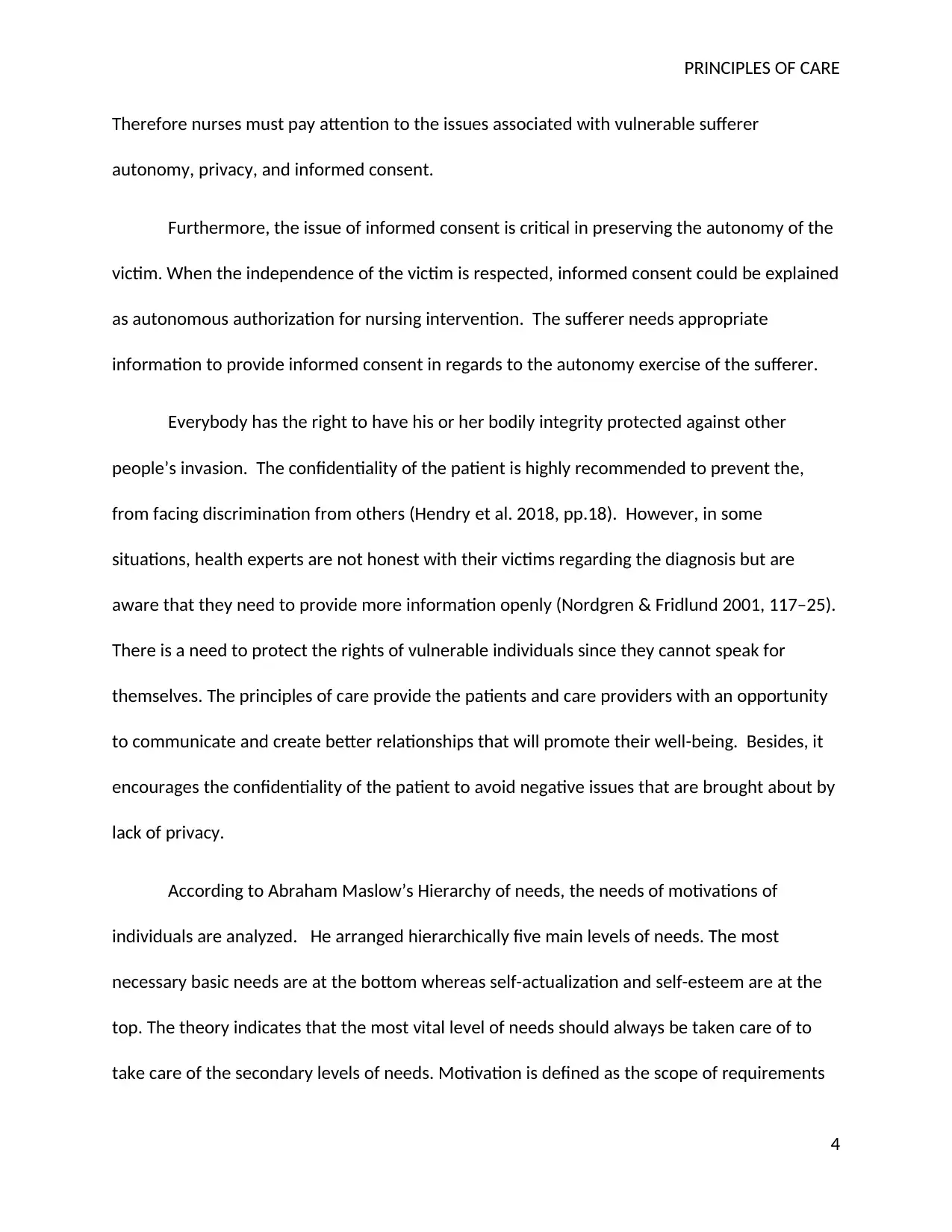
PRINCIPLES OF CARE
Therefore nurses must pay attention to the issues associated with vulnerable sufferer
autonomy, privacy, and informed consent.
Furthermore, the issue of informed consent is critical in preserving the autonomy of the
victim. When the independence of the victim is respected, informed consent could be explained
as autonomous authorization for nursing intervention. The sufferer needs appropriate
information to provide informed consent in regards to the autonomy exercise of the sufferer.
Everybody has the right to have his or her bodily integrity protected against other
people’s invasion. The confidentiality of the patient is highly recommended to prevent the,
from facing discrimination from others (Hendry et al. 2018, pp.18). However, in some
situations, health experts are not honest with their victims regarding the diagnosis but are
aware that they need to provide more information openly (Nordgren & Fridlund 2001, 117–25).
There is a need to protect the rights of vulnerable individuals since they cannot speak for
themselves. The principles of care provide the patients and care providers with an opportunity
to communicate and create better relationships that will promote their well-being. Besides, it
encourages the confidentiality of the patient to avoid negative issues that are brought about by
lack of privacy.
According to Abraham Maslow’s Hierarchy of needs, the needs of motivations of
individuals are analyzed. He arranged hierarchically five main levels of needs. The most
necessary basic needs are at the bottom whereas self-actualization and self-esteem are at the
top. The theory indicates that the most vital level of needs should always be taken care of to
take care of the secondary levels of needs. Motivation is defined as the scope of requirements
4
Therefore nurses must pay attention to the issues associated with vulnerable sufferer
autonomy, privacy, and informed consent.
Furthermore, the issue of informed consent is critical in preserving the autonomy of the
victim. When the independence of the victim is respected, informed consent could be explained
as autonomous authorization for nursing intervention. The sufferer needs appropriate
information to provide informed consent in regards to the autonomy exercise of the sufferer.
Everybody has the right to have his or her bodily integrity protected against other
people’s invasion. The confidentiality of the patient is highly recommended to prevent the,
from facing discrimination from others (Hendry et al. 2018, pp.18). However, in some
situations, health experts are not honest with their victims regarding the diagnosis but are
aware that they need to provide more information openly (Nordgren & Fridlund 2001, 117–25).
There is a need to protect the rights of vulnerable individuals since they cannot speak for
themselves. The principles of care provide the patients and care providers with an opportunity
to communicate and create better relationships that will promote their well-being. Besides, it
encourages the confidentiality of the patient to avoid negative issues that are brought about by
lack of privacy.
According to Abraham Maslow’s Hierarchy of needs, the needs of motivations of
individuals are analyzed. He arranged hierarchically five main levels of needs. The most
necessary basic needs are at the bottom whereas self-actualization and self-esteem are at the
top. The theory indicates that the most vital level of needs should always be taken care of to
take care of the secondary levels of needs. Motivation is defined as the scope of requirements
4
Paraphrase This Document
Need a fresh take? Get an instant paraphrase of this document with our AI Paraphraser
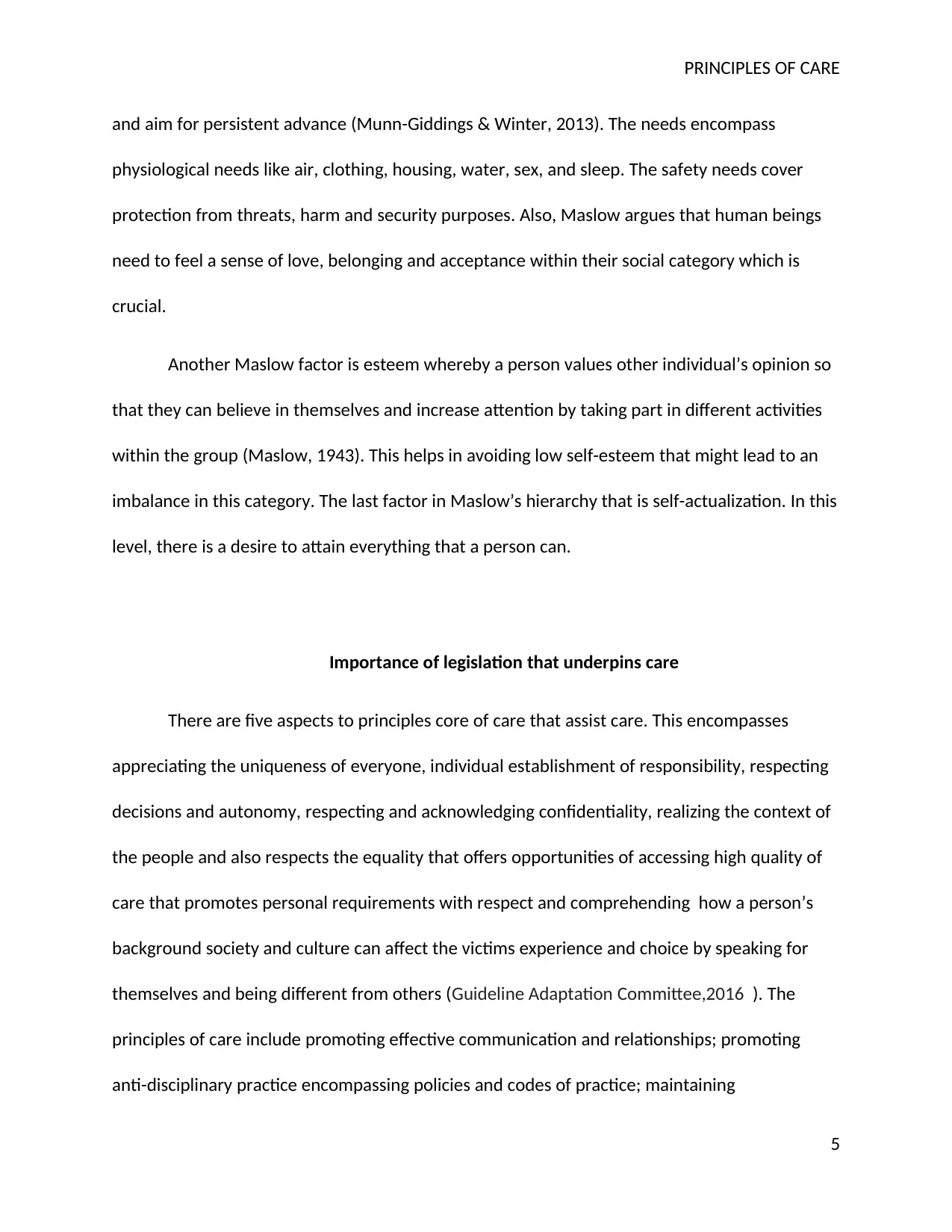
PRINCIPLES OF CARE
and aim for persistent advance (Munn-Giddings & Winter, 2013). The needs encompass
physiological needs like air, clothing, housing, water, sex, and sleep. The safety needs cover
protection from threats, harm and security purposes. Also, Maslow argues that human beings
need to feel a sense of love, belonging and acceptance within their social category which is
crucial.
Another Maslow factor is esteem whereby a person values other individual’s opinion so
that they can believe in themselves and increase attention by taking part in different activities
within the group (Maslow, 1943). This helps in avoiding low self-esteem that might lead to an
imbalance in this category. The last factor in Maslow’s hierarchy that is self-actualization. In this
level, there is a desire to attain everything that a person can.
Importance of legislation that underpins care
There are five aspects to principles core of care that assist care. This encompasses
appreciating the uniqueness of everyone, individual establishment of responsibility, respecting
decisions and autonomy, respecting and acknowledging confidentiality, realizing the context of
the people and also respects the equality that offers opportunities of accessing high quality of
care that promotes personal requirements with respect and comprehending how a person’s
background society and culture can affect the victims experience and choice by speaking for
themselves and being different from others (Guideline Adaptation Committee,2016 ). The
principles of care include promoting effective communication and relationships; promoting
anti-disciplinary practice encompassing policies and codes of practice; maintaining
5
and aim for persistent advance (Munn-Giddings & Winter, 2013). The needs encompass
physiological needs like air, clothing, housing, water, sex, and sleep. The safety needs cover
protection from threats, harm and security purposes. Also, Maslow argues that human beings
need to feel a sense of love, belonging and acceptance within their social category which is
crucial.
Another Maslow factor is esteem whereby a person values other individual’s opinion so
that they can believe in themselves and increase attention by taking part in different activities
within the group (Maslow, 1943). This helps in avoiding low self-esteem that might lead to an
imbalance in this category. The last factor in Maslow’s hierarchy that is self-actualization. In this
level, there is a desire to attain everything that a person can.
Importance of legislation that underpins care
There are five aspects to principles core of care that assist care. This encompasses
appreciating the uniqueness of everyone, individual establishment of responsibility, respecting
decisions and autonomy, respecting and acknowledging confidentiality, realizing the context of
the people and also respects the equality that offers opportunities of accessing high quality of
care that promotes personal requirements with respect and comprehending how a person’s
background society and culture can affect the victims experience and choice by speaking for
themselves and being different from others (Guideline Adaptation Committee,2016 ). The
principles of care include promoting effective communication and relationships; promoting
anti-disciplinary practice encompassing policies and codes of practice; maintaining
5

PRINCIPLES OF CARE
confidentiality of information; encouraging and supporting individual’s right to dignity,
independence, empowerment, choice and safety ; acknowledging individuals personal beliefs
and identity and respecting diversity; protecting individuals from abuse; giving personalized
care.
People who need care and attention require social support from healthcare experts,
social help and social care providers as ascertained in social responsibility. This is essential for
the victims especially drug addicts, people with disability, poverty and old people in the society
(Oxtoby, 2010, p.c6025). Therefore it is useful to involve the principles of care in work
undertaken in social and health care. For example in the case of Winterbourne View which was
a private hospital owned by Castle-beck Care Limited.
The hospital was designed to harbor 24 sufferers into different wards, and it was
registered as a sanatorium giving evaluation and treatment and rehabilitation for people with
learning disabilities and autism. The facility was closed after the Paranoma investigation which
found out that there was systematic abuse while the patients are suffering since they are away
from their families and the staff is out of control. The families were not allowed to go inside the
room, but they wait for the patients in the visiting area. The care provider mistreated the
patients in the presence of other caregivers. There were there were there e caregivers who
harmed a patient by taking the patient to the floor, and one of them is lying across the patient s
chest with an arm across the throat. The patient suffered an injured arm the previous year. This
was not assistance or treatment but a punishment.
6
confidentiality of information; encouraging and supporting individual’s right to dignity,
independence, empowerment, choice and safety ; acknowledging individuals personal beliefs
and identity and respecting diversity; protecting individuals from abuse; giving personalized
care.
People who need care and attention require social support from healthcare experts,
social help and social care providers as ascertained in social responsibility. This is essential for
the victims especially drug addicts, people with disability, poverty and old people in the society
(Oxtoby, 2010, p.c6025). Therefore it is useful to involve the principles of care in work
undertaken in social and health care. For example in the case of Winterbourne View which was
a private hospital owned by Castle-beck Care Limited.
The hospital was designed to harbor 24 sufferers into different wards, and it was
registered as a sanatorium giving evaluation and treatment and rehabilitation for people with
learning disabilities and autism. The facility was closed after the Paranoma investigation which
found out that there was systematic abuse while the patients are suffering since they are away
from their families and the staff is out of control. The families were not allowed to go inside the
room, but they wait for the patients in the visiting area. The care provider mistreated the
patients in the presence of other caregivers. There were there were there e caregivers who
harmed a patient by taking the patient to the floor, and one of them is lying across the patient s
chest with an arm across the throat. The patient suffered an injured arm the previous year. This
was not assistance or treatment but a punishment.
6
⊘ This is a preview!⊘
Do you want full access?
Subscribe today to unlock all pages.

Trusted by 1+ million students worldwide

PRINCIPLES OF CARE
The principles of care could be essential for the improvement of health and social care
services (Jackson n.d, pp.339-344). Winterbourne view hospital could have ensured that the
patients are treated well regardless of their ethnicities and backgrounds. In contemporary
society, there are many different people from different ethnicities, color religion and other
things that signify their existence.
Legislation
Law is essential in promoting healthcare and helping individuals to access same services.
It helps the responsibility to make sure that agencies and individuals provide periodically and
proportionate responses when abuse or neglect have happened (Aveyard, 2014). Additionally, a
lot of people have been neglected due to their learning disorder, and many are also
discriminated.
Furthermore, it empowers people and supports them to make their own decisions and
give informed consent regarding their treatment (Dimond, 2016). Also, the policy encourages
prevention since it is better to take action before a problem happens. Preventions help in
avoiding critical issues in the future (Department of Health, 2013). Moreover, the Mental
Health Act 2007 aims to give mental health care services for individuals with mental sickness.
Every individual has a right to confidentiality in respect of his or her illness and treatment
(Cameron, Lart, Bostock, and Coomber 2014, pp.225-233).
Additionally, The Safeguarding Vulnerable Groups Act (SVGA) 2006 protects the dignity
encompassing treating people with respect. It also helps in avoiding harm by preventing
individuals who are deemed unsuitable to work with vulnerable people from gaining entry to
7
The principles of care could be essential for the improvement of health and social care
services (Jackson n.d, pp.339-344). Winterbourne view hospital could have ensured that the
patients are treated well regardless of their ethnicities and backgrounds. In contemporary
society, there are many different people from different ethnicities, color religion and other
things that signify their existence.
Legislation
Law is essential in promoting healthcare and helping individuals to access same services.
It helps the responsibility to make sure that agencies and individuals provide periodically and
proportionate responses when abuse or neglect have happened (Aveyard, 2014). Additionally, a
lot of people have been neglected due to their learning disorder, and many are also
discriminated.
Furthermore, it empowers people and supports them to make their own decisions and
give informed consent regarding their treatment (Dimond, 2016). Also, the policy encourages
prevention since it is better to take action before a problem happens. Preventions help in
avoiding critical issues in the future (Department of Health, 2013). Moreover, the Mental
Health Act 2007 aims to give mental health care services for individuals with mental sickness.
Every individual has a right to confidentiality in respect of his or her illness and treatment
(Cameron, Lart, Bostock, and Coomber 2014, pp.225-233).
Additionally, The Safeguarding Vulnerable Groups Act (SVGA) 2006 protects the dignity
encompassing treating people with respect. It also helps in avoiding harm by preventing
individuals who are deemed unsuitable to work with vulnerable people from gaining entry to
7
Paraphrase This Document
Need a fresh take? Get an instant paraphrase of this document with our AI Paraphraser

PRINCIPLES OF CARE
them through their work (Department of Health, 2013). The Care Act 2014 offers assistance
that aims to take responsibility and support the patients clearer and fairer and also develop
personalization in care (Howard 2004, 212-215). This act helps the vulnerable people in
promoting their wellbeing at the center of decisions. Also, Data Protection Act 2018 protects
individuals and provide rules about how information about individuals can be used. The
Equality Act 2010 protects individuals that experience discrimination because they are
associated with a person who has preserved features which encompass maturity, disability, sex,
religion or belief, and race. Lastly, The Health and Social Act of 2012 seeks to modernize care by
supporting new services and providing victims with a more significant voice in their care.
Issues of care and control in health and social care
Nurses are taking full independence for diagnosis and prescriptions. There is a need for
individual experts to pay attention to their accountability with this independence. Also, there is
a risk in existence in all areas of practice. The community nurses will be expected to adopt
responsibilities that have been taken by other experts which may be related to high levels of
Risks (Vincent, Taylor-Adams, Chapman, et al., 2000). The existing developments create
chances to improve patient care and also to help them to be aware of their accountability. This
will assist in identifying risks and provide a necessary solution. The health practitioners embrace
their responsibility and engage in risk management. The nurses act proactively to make sure
that they give high-quality service that meets the victim’s requirements by applying the
principles of risk management (Keleher and MacDougall, 2015). The process of risk
management involves the risk identification, selection, and evaluation of measures to decrease
8
them through their work (Department of Health, 2013). The Care Act 2014 offers assistance
that aims to take responsibility and support the patients clearer and fairer and also develop
personalization in care (Howard 2004, 212-215). This act helps the vulnerable people in
promoting their wellbeing at the center of decisions. Also, Data Protection Act 2018 protects
individuals and provide rules about how information about individuals can be used. The
Equality Act 2010 protects individuals that experience discrimination because they are
associated with a person who has preserved features which encompass maturity, disability, sex,
religion or belief, and race. Lastly, The Health and Social Act of 2012 seeks to modernize care by
supporting new services and providing victims with a more significant voice in their care.
Issues of care and control in health and social care
Nurses are taking full independence for diagnosis and prescriptions. There is a need for
individual experts to pay attention to their accountability with this independence. Also, there is
a risk in existence in all areas of practice. The community nurses will be expected to adopt
responsibilities that have been taken by other experts which may be related to high levels of
Risks (Vincent, Taylor-Adams, Chapman, et al., 2000). The existing developments create
chances to improve patient care and also to help them to be aware of their accountability. This
will assist in identifying risks and provide a necessary solution. The health practitioners embrace
their responsibility and engage in risk management. The nurses act proactively to make sure
that they give high-quality service that meets the victim’s requirements by applying the
principles of risk management (Keleher and MacDougall, 2015). The process of risk
management involves the risk identification, selection, and evaluation of measures to decrease
8
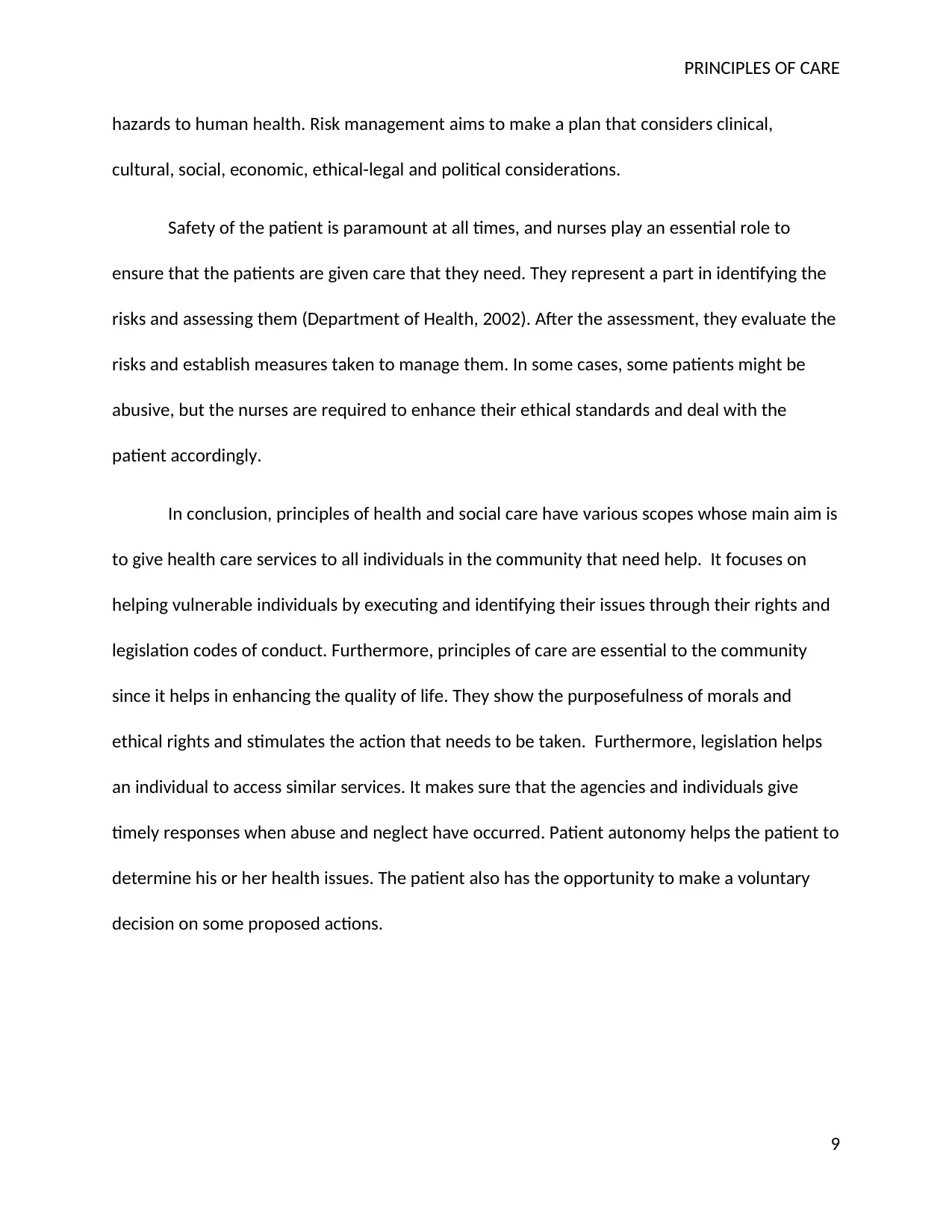
PRINCIPLES OF CARE
hazards to human health. Risk management aims to make a plan that considers clinical,
cultural, social, economic, ethical-legal and political considerations.
Safety of the patient is paramount at all times, and nurses play an essential role to
ensure that the patients are given care that they need. They represent a part in identifying the
risks and assessing them (Department of Health, 2002). After the assessment, they evaluate the
risks and establish measures taken to manage them. In some cases, some patients might be
abusive, but the nurses are required to enhance their ethical standards and deal with the
patient accordingly.
In conclusion, principles of health and social care have various scopes whose main aim is
to give health care services to all individuals in the community that need help. It focuses on
helping vulnerable individuals by executing and identifying their issues through their rights and
legislation codes of conduct. Furthermore, principles of care are essential to the community
since it helps in enhancing the quality of life. They show the purposefulness of morals and
ethical rights and stimulates the action that needs to be taken. Furthermore, legislation helps
an individual to access similar services. It makes sure that the agencies and individuals give
timely responses when abuse and neglect have occurred. Patient autonomy helps the patient to
determine his or her health issues. The patient also has the opportunity to make a voluntary
decision on some proposed actions.
9
hazards to human health. Risk management aims to make a plan that considers clinical,
cultural, social, economic, ethical-legal and political considerations.
Safety of the patient is paramount at all times, and nurses play an essential role to
ensure that the patients are given care that they need. They represent a part in identifying the
risks and assessing them (Department of Health, 2002). After the assessment, they evaluate the
risks and establish measures taken to manage them. In some cases, some patients might be
abusive, but the nurses are required to enhance their ethical standards and deal with the
patient accordingly.
In conclusion, principles of health and social care have various scopes whose main aim is
to give health care services to all individuals in the community that need help. It focuses on
helping vulnerable individuals by executing and identifying their issues through their rights and
legislation codes of conduct. Furthermore, principles of care are essential to the community
since it helps in enhancing the quality of life. They show the purposefulness of morals and
ethical rights and stimulates the action that needs to be taken. Furthermore, legislation helps
an individual to access similar services. It makes sure that the agencies and individuals give
timely responses when abuse and neglect have occurred. Patient autonomy helps the patient to
determine his or her health issues. The patient also has the opportunity to make a voluntary
decision on some proposed actions.
9
⊘ This is a preview!⊘
Do you want full access?
Subscribe today to unlock all pages.

Trusted by 1+ million students worldwide

PRINCIPLES OF CARE
Reference
Aveyard, H., 2014. Doing a literature review in health and social care: A practical guide.
McGraw-Hill Education (UK).
Barr, J., Fraser, G.L., Puntillo, K., Ely, E.W., Gélinas, C., Dasta, J.F., Davidson, J.E., Devlin, J.W.,
Kress, J.P., Joffe, A.M. and Coursin, D.B., 2013. Clinical practice guidelines for the
management of pain, agitation, and delirium in adult patients in the intensive care
unit. Critical care medicine, 41(1), pp.263-306.
Cameron, A., Lart, R., Bostock, L. and Coomber, C., 2014. Factors that promote and hinder
joint and integrated working between health and social care services: a review of research
literature. Health & social care in the community, 22(3), pp.225-233.
Dang, B.N., Westbrook, R.A., Njue, S.M. and Giordano, T.P., 2017. Building trust and rapport
early in the new doctor-patient relationship: a longitudinal qualitative study. BMC medical
education, 17(1), p.32.
Department of Health (2013) Draft National Minimum Eligibility Threshold for Adult Care
and Support. Available at:
https://www.gov.uk/government/uploads/system/uploads/attachment_data/file/209595/
National_Eligibility_Criteria_-_discussion_document.pdf accessed on [11/10/2016]
Department of Health (DH) (2002) Liberating the Talents: Helping Primary Care Trusts and
Nurses Deliver the NHS Plan. DH, London
10
Reference
Aveyard, H., 2014. Doing a literature review in health and social care: A practical guide.
McGraw-Hill Education (UK).
Barr, J., Fraser, G.L., Puntillo, K., Ely, E.W., Gélinas, C., Dasta, J.F., Davidson, J.E., Devlin, J.W.,
Kress, J.P., Joffe, A.M. and Coursin, D.B., 2013. Clinical practice guidelines for the
management of pain, agitation, and delirium in adult patients in the intensive care
unit. Critical care medicine, 41(1), pp.263-306.
Cameron, A., Lart, R., Bostock, L. and Coomber, C., 2014. Factors that promote and hinder
joint and integrated working between health and social care services: a review of research
literature. Health & social care in the community, 22(3), pp.225-233.
Dang, B.N., Westbrook, R.A., Njue, S.M. and Giordano, T.P., 2017. Building trust and rapport
early in the new doctor-patient relationship: a longitudinal qualitative study. BMC medical
education, 17(1), p.32.
Department of Health (2013) Draft National Minimum Eligibility Threshold for Adult Care
and Support. Available at:
https://www.gov.uk/government/uploads/system/uploads/attachment_data/file/209595/
National_Eligibility_Criteria_-_discussion_document.pdf accessed on [11/10/2016]
Department of Health (DH) (2002) Liberating the Talents: Helping Primary Care Trusts and
Nurses Deliver the NHS Plan. DH, London
10
Paraphrase This Document
Need a fresh take? Get an instant paraphrase of this document with our AI Paraphraser

PRINCIPLES OF CARE
Dickinson, H. and O'Flynn, J., 2016. Evaluating Outcomes in Health and Social Care 2e. Policy
Press.
Dimond, B.C., 2016. Legal Aspects of Mental Capacity: A Practical Guide for Health and
Social Care Professionals. John Wiley & Sons.
Guideline Adaptation Committee, 2016. Clinical practice guidelines and principles of care for
people with dementia. Sydney: Guideline Adaptation Committee.
Hendry, A., Taylor, A., Millar, S., Rainey, H., Whoriskey, M. and Knight, P., 2018. Beyond the
legislation-investing in sustainable transformation. International Journal of Integrated
Care, pp.18
Howard, H. (2004) The principles of care: How to value difference. Nursing and Residential
Care, vol, 6, no. 5, Pg. 212-215 - [available as an handout on Moodle2]
Jackson, J., n.d. Personal Beliefs and Patient Care. Principles of Health Care Ethics, pp.339–
344.
Keleher, H. and MacDougall, C., 2015. Understanding health(No. Ed. 4). Oxford University
Press.
Lakdawala, P.D., 2015. Doctor-patient relationship in psychiatry. Mens sana
monographs, 13(1), p.82.
Maslow, a. h. (1943). A theory of human motivation. psychological review
Munn-Giddings, C., & Winter, R. (2013). A handbook for action research in health and social
care. Routledge
11
Dickinson, H. and O'Flynn, J., 2016. Evaluating Outcomes in Health and Social Care 2e. Policy
Press.
Dimond, B.C., 2016. Legal Aspects of Mental Capacity: A Practical Guide for Health and
Social Care Professionals. John Wiley & Sons.
Guideline Adaptation Committee, 2016. Clinical practice guidelines and principles of care for
people with dementia. Sydney: Guideline Adaptation Committee.
Hendry, A., Taylor, A., Millar, S., Rainey, H., Whoriskey, M. and Knight, P., 2018. Beyond the
legislation-investing in sustainable transformation. International Journal of Integrated
Care, pp.18
Howard, H. (2004) The principles of care: How to value difference. Nursing and Residential
Care, vol, 6, no. 5, Pg. 212-215 - [available as an handout on Moodle2]
Jackson, J., n.d. Personal Beliefs and Patient Care. Principles of Health Care Ethics, pp.339–
344.
Keleher, H. and MacDougall, C., 2015. Understanding health(No. Ed. 4). Oxford University
Press.
Lakdawala, P.D., 2015. Doctor-patient relationship in psychiatry. Mens sana
monographs, 13(1), p.82.
Maslow, a. h. (1943). A theory of human motivation. psychological review
Munn-Giddings, C., & Winter, R. (2013). A handbook for action research in health and social
care. Routledge
11
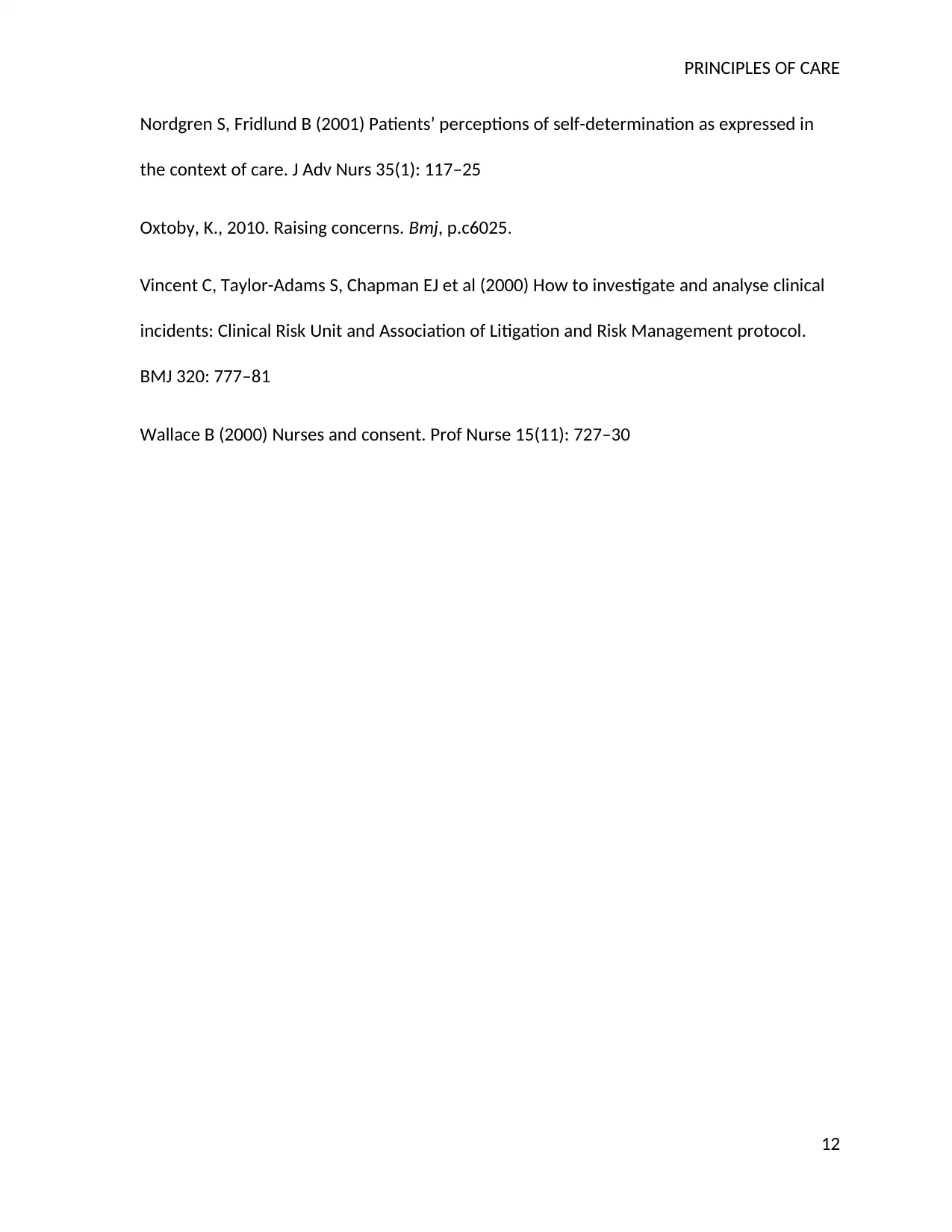
PRINCIPLES OF CARE
Nordgren S, Fridlund B (2001) Patients’ perceptions of self-determination as expressed in
the context of care. J Adv Nurs 35(1): 117–25
Oxtoby, K., 2010. Raising concerns. Bmj, p.c6025.
Vincent C, Taylor-Adams S, Chapman EJ et al (2000) How to investigate and analyse clinical
incidents: Clinical Risk Unit and Association of Litigation and Risk Management protocol.
BMJ 320: 777–81
Wallace B (2000) Nurses and consent. Prof Nurse 15(11): 727–30
12
Nordgren S, Fridlund B (2001) Patients’ perceptions of self-determination as expressed in
the context of care. J Adv Nurs 35(1): 117–25
Oxtoby, K., 2010. Raising concerns. Bmj, p.c6025.
Vincent C, Taylor-Adams S, Chapman EJ et al (2000) How to investigate and analyse clinical
incidents: Clinical Risk Unit and Association of Litigation and Risk Management protocol.
BMJ 320: 777–81
Wallace B (2000) Nurses and consent. Prof Nurse 15(11): 727–30
12
⊘ This is a preview!⊘
Do you want full access?
Subscribe today to unlock all pages.

Trusted by 1+ million students worldwide
1 out of 12
Related Documents
Your All-in-One AI-Powered Toolkit for Academic Success.
+13062052269
info@desklib.com
Available 24*7 on WhatsApp / Email
![[object Object]](/_next/static/media/star-bottom.7253800d.svg)
Unlock your academic potential
Copyright © 2020–2026 A2Z Services. All Rights Reserved. Developed and managed by ZUCOL.




